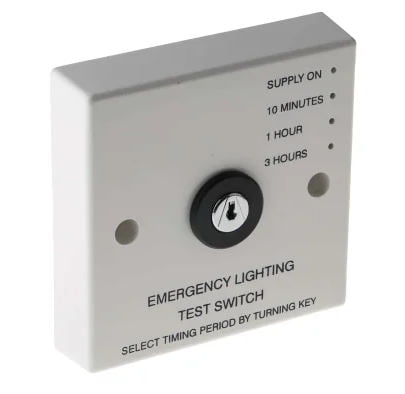So you know you have to test your emergency lights, but How?
Estimated reading time: 4 minutes
See when to test your emergency lights here.
The majority of UK buildings will have their emergency lights wired on the same circuit as the lighting. For obvious reasons; when the main lights go out you want the emergency lights on. Hopefully they will be connected to a test key switch, like these
Who can test emergency lights
Anyone. There will be a responsible person tasked with ensuring that the emergency lights are working correctly. That person will be entering the test results into the logbook. It is this responsible person that should perform the test, but they do not need technical knowledge of electrical wiring systems. If they find a fault then they will need to ensure that the problem is fixed and re-test.


To test the emergency lights
- Insert the key and turn off the power to the lights, this should make them come on.
- Start a timer.
- Walk around where these lights are now illuminated and check that they are working correctly.
- After the time that you want to test (functional, 10 minutes or 3 hours), flick the switch again to turn the power back on to the system.
- Check the emergency lights again to ensure that the charge indicator is illuminated.
- Records the results in your logbook.
I don’t have a test key switch
Sometimes there isn’t a test key switch. If not then you have to find the consumer unit and turn off the power to the whole circuit that controls the emergency lights. Hopefully it will be marked which one it is, but it could be more than one circuit.
** Be very careful when touching anything inside the electrical consumer box, there is a danger of electrocution if something is wrong. If in doubt seek a qualified electrician **
What time of day should I test the emergency lights
The time that you test your emergency lights is just as important as the test itself. Emergency lights are there for a purpose, for the next 24 hours after a 3 hour test you potentially have a reduced system that cannot provide 3 hours of emergency light. You start a 3 hour test at 9am, then at 12pm the lights are going to be back charging again. If there is a power cut at 12:30pm then the emergency lights will not operate for very long and you may have a problem.
If everyone goes home at 5pm then perhaps start the test then, or up to 3 hours before. So you know that if there was a problem after the test no one would be in the building and the emergency lights would have a long time to recharge overnight, before people start working again in the morning.
But the building is used 24/7 365 days a year!
Is your building permanently used E.G. Hotels, then you need to test the lights so that the end of the test corresponds to the start of day. In this way the emergency lights will have a good time to recharge during daylight hours. Natural daylight will help if the emergency lights don’t last 3 hours.
Should I test ALL emergency lights at once?
Yes and no. If it is a small building and all the emergency lights are on one circuit, then yes, you have no choice. However if it is a large building then it would make sense to stagger the testing. This way the whole building would not be affected if there was a power cut, during the recharge time.
Testing Central Battery Systems
If you have a central battery system, then most of the above still applies to you. Drop the incoming power to the battery and do the same walk tests. Make a note of any failures etc. However you need to test the whole system all at once. By testing the whole system at once, you are ensuring that the battery can power all the emergency lights for a full 3 hour duration. If you only tested in zones then the battery would not get a full and proper test.
Remember to log all your results into your logbook.
What to do when emergency lights fail.
This is just a guide to testing and you should always seek advice from a professional electrician or your local fire officer.
